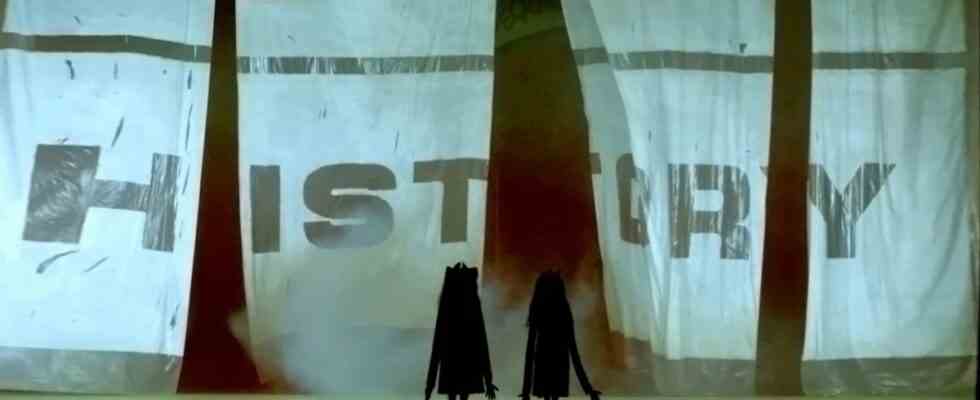Of course it’s completely crazy, oppressive and also bizarre when you go to a musical theater performance in which the world is in ruins, the opera is broken and strange soulless beings dominate the scenery. Would Ole Hübner’s opera “Opera, Opera, Opera! Revenants and Revolutions” be as planned two years ago at the Munich Music Theater Biennale Coming out in 2020, she would have been another example of the lust for dystopia that has been a constant on the stages for quite some time. But the pandemic made the festival edition impossible, and now that there is war in Europe, devastation is no longer a mind game. Even what is left of the once planned production is only its ruins. The world premiere, which has now been rescheduled at Utopia in Munich, now bears the title “Opera and its Double”.
One hour remains of the original music
When the 2020 Biennale was cancelled, its directors Daniel Ott and Manos Tsangaris set about saving as many of the planned premieres as possible and releasing them by the next edition of the festival, which will take place in May of this year. Some of it could only be realized digitally, “Opera and her Double” is the last work from the pool of 2020 that could be staged. At least in parts. Because the original work is actually two and a half hours long. At the Halle Opera, which was co-producing at the time, rehearsals were still taking place under Corona conditions, and MDR recorded almost an hour of music. This is now the sounding basis of the installation that Michael von zur Mühlen set up in Utopia. For this he shot video sequences with the soloists on the empty stage of the opera house in Halle, developed digital image sequences animated on the computer and built a three-part room that works wonderfully as a walk-in image on its own. As you first wander around, you are enveloped by a buzzing and shimmering, by choral sequences out of nowhere, by somewhat enigmatic sounds that never seem outrageously new, until you finally, in the third room, sit in front of large screens and watch a video.
Ole Hübner, born in 1993 and at home in various artistic collectives, seems filled with the furor of youth to fundamentally question the genre in which he himself composes. He knows the pool of operatic works, but has not yet found his own way out of it. But he is well versed in searching, he can also write elaborate orchestral movements, works a lot with electronics and likes to invent instruments, especially for percussion. Unfortunately, you can’t see the Staatskapelle Halle, the conductor Michael Wendeberg and the instruments in the installation – the rehearsal recording by MDR was purely acoustic.
The text is reminiscent of private, social, political and other catastrophes
Above all, one hears a polyphonic choir plowing through the libretto by Thomas Köck. The text should be understood as the “fourth, lost part” of his “Climate Trilogy”, and what one then understands concretely is sometimes reminiscent of a Brecht setting in the style. There are variations on a “shitty life” determined by others, memories of private, social, political and other catastrophes. The text is fluid, as is the music, chunks keep swimming by that you can almost haptically get hold of in the immediate reception. Then, for example, reference is made to the performance of Auber’s opera “Die Stumme von Portici” in Brussels in 1830, which triggered an uproar in the audience, a revolution on the streets and finally Belgium’s independence from the Netherlands. The call back then was “Aux armes – to arms”.
Once again: the piece and the installation are not a commentary on the ghastly world events at the moment. But since Michael von zur Mühlen as a director has long since said goodbye to coherence as a necessary category for an opera performance, his installation is also permeable to the outside world. First you move in an art discourse, past cardboard cutouts of the staff, who are richly dressed up in a post-apocalyptic way, which you meet again later in the video. In the midst of this carnival of horror, festively dressed puppets sit on brocade benches, seem overwhelmed by an eternal opera sleep, the rest of the audience from a “remaining opera evening”. One encounters a forest installation that is supposed to refer to the “German Autumn” and finally, in the videos, a half-destroyed opera building, a few ghostly avatars in an otherwise empty auditorium and real soloists, a cyborg with a misprogrammed voice and two iridescent ones Beings, living, female holograms, which alone lend the necessary sensuality to this view from the future of a destroyed past.
If “Opera and its Double” is ultimately an open offer of associations, one of the works that has just been completed and can be viewed purely digitally is fascinatingly concrete. Blanka Rádóczy stages “Transstimme”, an opera by Fabià Santcovsky based on a text by Anja Hilling, as a dazzling couples thriller in HD quality. The woman’s voice, the gorgeous Juliana Zara, forms the cocoon of a love that is then ruptured when she loses her natural ability to sing and it has to be replaced by an artificial one.

